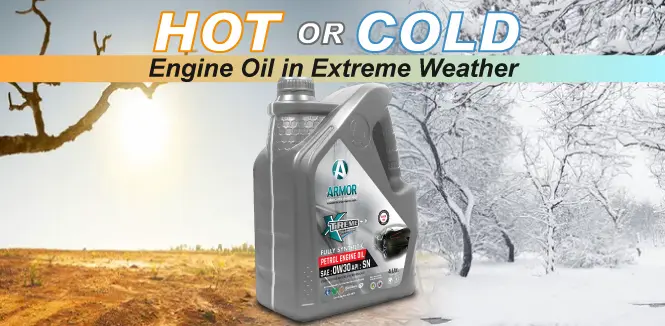- Armor Blog
- Vehicle
- Multigrade Engine Oil for Extreme Heat and Cold Temperatures

How Can the Weather Affect Engine Oil?
In extreme conditions, such as hot weather, cold weather, or dusty roads, your vehicle’s engine needs special protection. Multigrade engine oil can provide that protection, helping to keep your engine running smoothly and efficiently.
Multigrade engine oil is a type of oil that has a high viscosity index. This means that it can maintain its viscosity over a wide range of temperatures. In hot weather, multigrade oil will not thin out as much as a single-grade oil or monograde engine oil, which can help to prevent oil starvation and wear. In cold weather, multigrade oil will not thicken as much as a single-grade oil, which can help to improve cold-start performance.
In addition to its viscosity properties, multigrade engine oil also contains additives that can help to protect your engine from wear, corrosion, and oxidation. These additives can help to keep your engine running smoothly and efficiently, even in extreme conditions.
If you live in an area with extreme weather conditions, or if you frequently drive in harsh environments, then multigrade engine oil is a good choice for your vehicle. It can help to protect your engine and keep it running smoothly for many years to come.
What is Multigrade Engine Oil?
Multigrade engine oil is the miracle that changed the automotive world. Multi-voscosity oil can have the properties of two different oils depending on the temperature. For example, motor oil 10w40 has a viscosity of 10 in cold temperatures and 40 on hot days.
The secret to this behaviour lies in the chemical composition. Engine oil has special additives to change how the oil acts in different temperatures. Therefore, the oil will perform better in a wider range of temperatures.
How Can a Heat Wave Affect Multigrade Engine Oil?
Multi-viscosity oil does a great job lubricating the engine in different weathers. It also keeps the engine from tear and wear longer. Yet, the chemical composition of the oil does not make it immune to heat changes, only more resistant.
When oil is exposed to temperatures higher than it should be, there will be consequences. Overheating can induce an increase in oxidation in the oil. Oxidation can cause sludge to build up in the engine, rust to form, and parts to wear out.
In addition to that, heat can make the additives volatilize and escape with gases into the air. Additives are the reason why engine oil can work in different temperatures; thus, having them volatilizing means loss of properties.
To understand about lubricant additives functions, benefits, types and its purpose, explore here.
How Cold Can Affect Multigrade Engine Oil?
Cold, on the other hand, can affect the Multigrade engine oil. Using the car in extremely low temperatures can leave a mark on the oil. The first to be affected is the viscosity of the oil since low temperature makes the oil more viscous. Higher viscosity can reduce the efficiency of the lubricant, leaving some parts without proper lubrication.
In certain conditions, the additives can fail to work. Without additives, the car engine oil will lose its properties and act like a normal oil, causing damage to the parts and accelerating the tear and corrosion. Another possible effect is the separation of the base oils when the motor oil has blended oil.
Protect Vehicle From Extreme Weather
As said before, engine oil is designed to withstand a wider range of temperatures. When the weather is a little colder or hotter than the engine oil is designed for, it should be ok. The car engine oil can work normally, and the effect will not appear.
However, if you are moving to another area, you should consider changing the engine oil to one that suits the new conditions.
In such a case, the engine oil change is important. The cost of a car engine change is certainly less than the cost of an engine breaking down.
Armor Lubricants and Multigrade Engine Oil
Extreme temperatures can wreak havoc on your engine. This post explores how multigrade engine oil provides optimal protection in both extreme heat and cold temperature. Armor Lubricants offers a range of high-performance multigrade oils engineered with advanced formulations to provide superior protection and to engine running smoothly, no matter the weather. Know more about our advanced formulations and Explore our range of premium grade engine oils manufactured in UAE at best price.




 Spear Lubricants
Spear Lubricants Armada lubricant
Armada lubricant Ace lubricants
Ace lubricants Perfect lubricants
Perfect lubricants Enzo lubricants
Enzo lubricants Lawrence lubricants
Lawrence lubricants